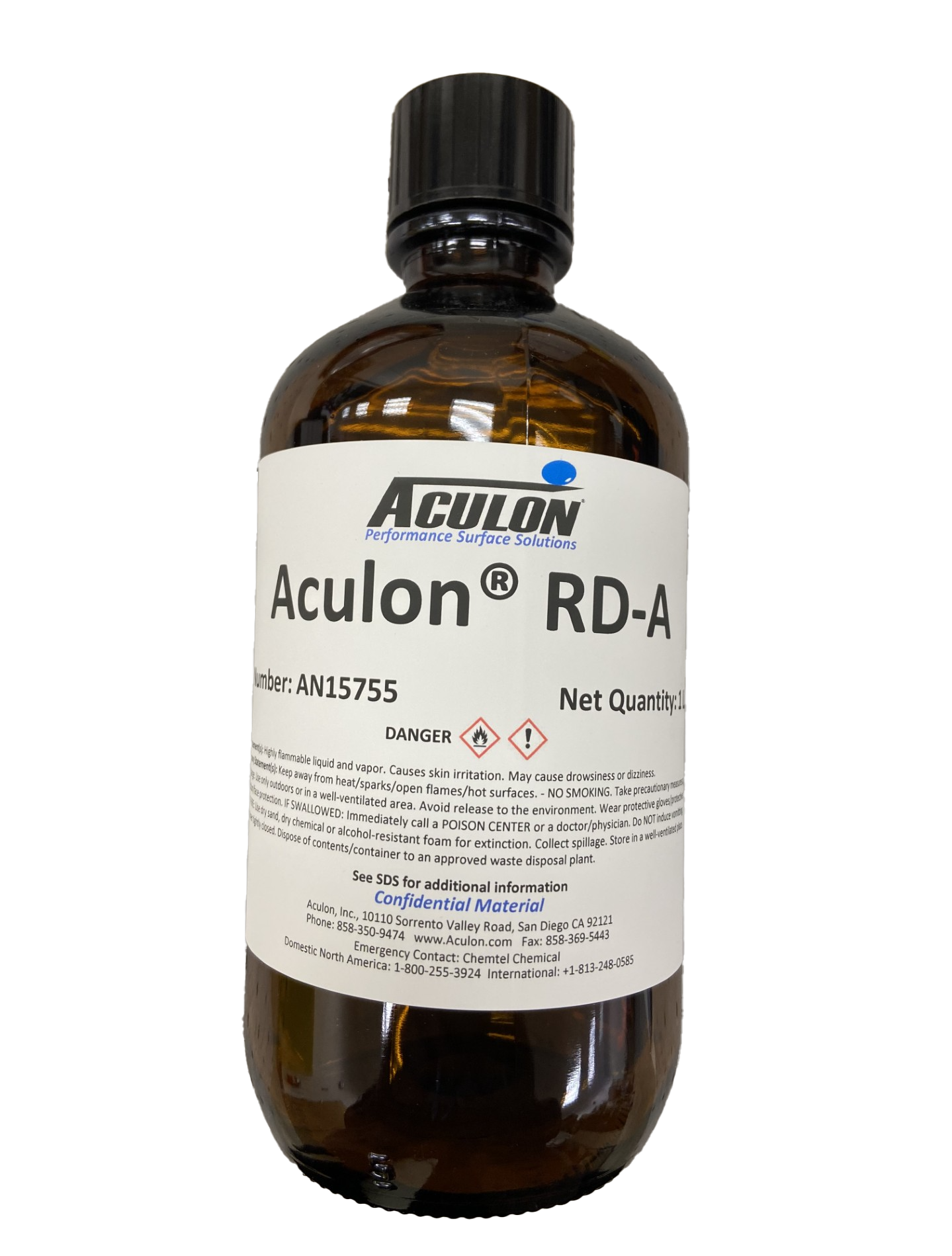RD-A primer | Isopropanol solvent
- Provides basic protection for accidental water damage
- Coating Thickness 5-100 nm
- For coatings that react with metal alkoxide functional groups
Product Description
Aculon's RD-A is a nano-scale organometallic coating product that is capable of promoting adhesion across a broad spectrum of metal surfaces. It is quick and easy to apply and will eliminate adhesive failures.
Aculon's RD-A adhesion primer can be applied via most traditional coating processes, including dipping, spraying, wiping, etc., and provides an optically clear, uniform coating thickness of 5-100 nm depending on the application. The Aculon RD-A surface treatment is designed to improve adhesion for coatings that react with metal alkoxide functional groups (e.g. silane/siloxanes, phosphonate/phosphates (acid forms), carboxylic acids, etc.).
Advantages of Aculon's RD-A
- Improved adhesion strength of silicone paints/coatings on metal surfaces
- Excellent chemical bonding to many metal surfaces
- Does not out-gas
- No stress build-up on the substrates
- Does not change the appearance of the surface
- Treated surfaces are very stable (if stored in typical office/lab conditions)
- Easy to apply through standard wet coating methods such as dipping or spraying
Technical Specifications
| General Properties | |
| Solids | 5% % |
| Specific Gravity Specific Gravity Specific gravity (SG) is the ratio of the density of a substance to the density of a reference substance; equivalently, it is the ratio of the mass of a substance to the mass of a reference substance for the same given volume. For liquids, the reference substance is almost always water (1), while for gases, it is air (1.18) at room temperature. Specific gravity is unitless. | 0.8 |
| Thermal Properties | |
| Boiling Point Boiling Point The amount of degree’s needed to reach in order to make the substance boil. | 82 °C |
| Flash Point Flash Point The flashpoint of a solvent is the lowest possible temperature at which it can vaporize to form an ignitable vapor. Flashpoint is often confused with “autoignition temperature”, which is the temperature at which a solvent ignites without an ignition source. | 12 °C |
| Electrical Properties | |
| Visible Light Transmission | 100% % |
| Other Properties | |
| Coating Thickness | 5-100 nm |
| Physical Properties | |
| Viscosity Viscosity Viscosity is a measurement of a fluid’s resistance to flow. Viscosity is commonly measured in centiPoise (cP). One cP is defined as the viscosity of water and all other viscosities are derived from this base. MPa is another common unit with a 1:1 conversion to cP. A product like honey would have a much higher viscosity -around 10,000 cPs- compared to water. As a result, honey would flow much slower out of a tipped glass than water would. The viscosity of a material can be decreased with an increase in temperature in order to better suit an application | 2 mPa.s |
Additional Information
How to apply the Aculon RD-A
STEP 1 ⇨ CLEAN | STEP 2 ⇨ TREAT | STEP 3 ⇨ DRY |
Parts must be sufficiently clean before treatment for proper bonding and effective application. To clean, solvents or soap and water can be used to degrease the substrate. Then, a cleaner is recommended to remove monolayer-scale contaminants.
| Wipe - With the wipe, thoroughly apply pressure to the location where the adhesive weight is intended to be mounted. Wait at least 30 seconds, then wipe the when with a clean dry towel to remove any residue (critical step). |
This product does not require a cure, however, in some cases and substrates a brief 5-minute cure at 60⁰C will benefit.
|
Spray - Spray the solution onto the substrate using double passes. | ||
Dip - Fully immerse the part in the treatment solution for 10 seconds, then air dry in a clean space. | ||
Dip with Sonification - Completely submerge the substrate in the solution and sonicate for 10 seconds. Then remove the substrate and allow it to air dry. |
Application Tips
- For spray application, post-application curing is recommended for best performance.
- Coat the substrate as soon as possible after cleaning to prevent recontamination.
- Spray Equipment Suggestions: HVLP(Binks Mach 1), HVLP(Devilbiss JGHV), Air Atomization(Devilbiss MBC gun), and Airless(Graco Model 225-292 President Pump Series A).
- Cure temperatures and conditions should be optimized based on substrate and durability requirements.
- Clean all equipment with alcohol (e.g., Isopropanol) or the solvent used.
- If a UV-curable coating system is being used, then it may be necessary to modify the curing parameters to ensure sufficient radical generation near the surface of the monolayer to achieve optimal adhesion.
Application Ideas
- Use as a primer layer for organosiloxanes/organophosphonates
- Improved bonding of silane (high temperature) over-mold compound



